Admin
[OPINION] Africa Day 2024: celebrating Africa with pomp and pageantry - Gabriel Njoku
A citadel of learning and a leading African financial institution rolled out the drums Saturday in separate celebrations to mark this year’s International Africa Day. At the University of Uyo, the celebrations were full of pomp and pageantry. There were speeches, songs, dances and theatre. The colourful event was attended by scholars, professors and dignitaries from across the continent, including former Vice President of The Gambia, Mrs. Fatoumata Tambajang; Prof. Mutombo Nkulu-N’Sengha from the United States and a large delegation from several West African countries. In addition, former Nigerian President, Dr. Goodluck Jonathan; Prof. Wole Soyinka and Kenya’s Prof. P.L.O Lumimba sent in goodwill messages. The celebrations were part of a three-day international conference on Dialogue and Pan Africanism organised by The Pan African Dialogue Institute (TPADI). TPADI is a network of academics, professionals and civil society leaders in different fields of life, within Africa and the diaspora, who are motivated by the best spirit of Pan Africanism to serve the continent and its people worldwide. Led by Dr. Effiong Udo, the institute has a collaborative working relationship with the University of Uyo and is headquartered inside the expansive campus.
Africa Day is celebrated every May 25; the birthday of the Organization of African Unity (OAU). It was on May 25, 1963, that the leaders of the then 32 independent African States signed a founding charter in Addis Ababa, Ethiopia, which brought the OAU into existence. In 2002, the OAU established its own successor, the African Union (AU), and adopted May 25 every year as a day to celebrate Africa and highlight the continent’s continued struggle against neocolonialism, exploitation and adversity. Many Nigerians are not aware of Africa Day, just as a lot of Africans and African leaders, including Nigeria’s, do not even remember to mark International Africa Day. Surprisingly, ever since the day was declared, only nine African countries (The Gambia, Ghana, Guinea, Lesotho, Mali, Mauritania, Zambia and Zimbabwe) are known to observe May 25 as public holiday with celebrations. The other 46 countries, including Nigeria are less aware of this very important day. With the celebrations at UniUyo last Saturday, this year marks the first time that the day is celebrated with the right degree of pomp in Nigeria.
The theme for the 2024 Africa Day is ‘’Educate an African Fit for the 21st Century: Building Resilient Education Systems for Increased Access to Inclusive, Lifelong, Quality and Relevant Learning in Africa’’ - a theme Access Holdings, one of the continent’s leading financial services groups, describes as “a poignant reminder of Africa's diversity and the need to address the educational challenges faced across the continent”. The Access Group is the only financial institution in Nigeria that has celebrated the day.
Africa is a vast and complex continent of over 1.2 billion people speaking more than 3,000 languages across 54 countries. Despite shared challenges, each nation contributes uniquely to the continent's rich cultural and historical mosaic. Unfortunately, education remains a significant hurdle. According to UNESCO and the African Union, over a quarter of school-age children in Africa were out of school in 2023, and 90% of children were unable to read or write by age 10. This stark reality underscores the need for urgent educational reforms to equip future generations.
Access Holdings is also celebrating the 2024 Africa Day in a big way. Aligning with this year’s theme, the leading African financial group will once again host the Access Bank/UNICEF Charity Shield Polo Tournament starting from the Children’s Day Anniversary on May 27, 2024, in Kaduna. This event, which will culminate at the Fifth Chukker Polo & Country Club on June 9, will bring together over 150 school pupils and their teachers for a day filled with sports, art activities, and messages promoting child welfare, such as “Stop Child Abuse” and “Childhood Isn’t Meant to Be a Nightmare.” As the largest charity polo tournament in Africa, this event highlights Access Bank's commitment to supporting underprivileged children, having donated over N700 million towards building schools and providing social amenities for surrounding communities in the past seven years.
Beyond education, there are numerous aspects of African heritage and achievements that deserve celebration. Each African nation offers its uniqueness to the richness of the African beauty and colour. Angola, for example, is Known for its vast oil reserves, Angola is also home to the ancient Tchitundo-Huluvilo Caves, a significant cultural landmark showcasing, prehistoric art. Botswana, celebrated for its stable democracy established by Sir Seretse Khama, is also renowned for producing world-class athletes like Amantle Montsho, a former world champion sprinter. Cameroon is home to the towering Mount Cameroon and the legendary musician Manu Dibango. Cameroon has made significant contributions to global music and boasts rich natural beauty.
The Democratic Republic of Congo (DRC) is known for its rich copper reserves and the majestic Congo River. The DRC is also the birthplace of Patrice Lumumba, a pivotal figure in Africa's fight for independence and pan Africanism. The Gambia, famous for its beautiful beaches and vibrant culture, is also making strides in education and tourism, becoming a notable destination in West Africa. A beacon of democracy and economic growth in West Africa, Ghana is widely celebrated for its rich history, including the Ashanti Kingdom and significant cultural festivals.
While Guinea, with its rich mineral resources, particularly bauxite, is also known for its vibrant music and dance traditions that play a crucial role in cultural identity, Kenya is remarkable for its breath-taking landscapes and wildlife, and is a leader in environmental conservation and home to world-renowned long-distance runners.
Mozambique is notable for its stunning coastline and rich cultural heritage, in addition to its vibrant arts scene, including music and dance. Nigeria, my country, my fatherland, my pride! Africa's most populous nation, Nigeria is celebrated for its diverse cultures, Nollywood film industry and significant contributions to literature and music. Through luminaries like Wole Soyinka, Chinua Achebe, Ngozi Chimanda Adichie; Cyprian Ekwensi and Fela Anikulapo Kuti, the Nigerian story is now heard in far-flung shores. Nigeria is also home to Dangote Petrochemical & Refinery, the continent’s largest petroleum refinery.
While Rwanda is a symbol of resilience and progress recognised for its remarkable strides in economic development and technological innovation, becoming a model for other African nations, Sierra Leone is easily known for its rich history and natural beauty. The country is also making progress in education and healthcare, contributing to a brighter future for its citizens, South Africa is famous for its stunning landscapes and diverse cultures and is a global leader in mining and a symbol of freedom and reconciliation, epitomised by Nelson Mandela. When you mention Zambia, its spectacular Victoria Falls comes to mind. Zambia is also making significant strides in economic development and conservation efforts.
Access Holdings operates in these African nations contributing uniquely to the continent's narrative, from historical landmarks to modern achievements in various fields. Said Bolaji Agbede, Acting Group Chief Executive of Access Holdings, “As we continue to consolidate the discourse around the 2024 Africa Day theme, we call on Africans to unite, invest in our incredible human resource even as we work to take our rightful place on the table of deliberations of global significance.” The University of Uyo Vice Chancellor, Prof. Nyaudo Ndaeyo, puts it differently, “The founding fathers of Pan Africanism contributed a lot to past liberation struggles in the continent. They fought for liberation from slave trade, transatlantic slave trade and colonialism. We need a new generation of Pan Africanists to take over and lead Africa through a new set of challenges plaguing the continent.”
[STATE HOUSE PRESS RELEASE] President Tinubu To Exxonmobil Executives: Executive Orders on Oil and Gas Reforms Will Make Nigeria Globally Competitive
President Bola Tinubu, on Tuesday in Abuja, said the three Executive Orders on oil and gas reforms, which he signed, will make Nigeria’s petroleum sector globally competitive.
The President made the affirmation during a meeting with a delegation from ExxonMobil Upstream Company, led by its President, Liam Mallon.
He emphasized that these reforms will ensure that no oil company faces undue challenges in the country.
The three Executive Orders, which became effective from February 28, 2024, are: Oil and Gas Companies (Tax Incentives, Exemption, Remission, etc.) Order, 2024; Presidential Directive on Local Content Compliance Requirements, 2024; and the Presidential Directive on Reduction of Petroleum Sector Contracting Costs and Timelines.
President Tinubu also assured the ExxonMobil delegation that the federal government is committed to resolving the divestment issues between the company and Seplat Energy, which are currently under litigation.
"We have been pushing for closure on divestment issues, and I believe the other party, Seplat, is open to this," the President said.
The President commended the company for its show of commitment to environmental protection in Nigeria, noting its efforts in reducing gas flaring in the country.
"Nigeria is going through a lot of reforms, and we have been navigating the leadership quarters carefully to ensure that we achieve a win-win situation for all parties and attract more investments," President Tinubu said.
The President described ExxonMobil as a worthy partner in Nigeria’s development over the decades and urged the company to remain committed to contributing to the success of his administration.
"We are close enough to be fair and blunt with you, and we are not afraid to hear from you on better options and recommendations for the growth of the industry in Nigeria," the President said.
The meeting, also attended by Heineken Lokpobiri, Minister of State for Petroleum Resources (Oil), and Ekperikpe Ekpo, Minister of State for Petroleum Resources (Gas), discussed issues such as divestment, decommissioning, and abandonment as regards the company.
"Mr. President has given a clear directive to the NNPC GCEO and I to resolve the issue of divestment, and we are doing whatever we can to achieve that," Lokpobiri stated.
On decommissioning and abandonment in the oil industry, Lokpobiri noted that the ministry is addressing the matter in line with the Petroleum Industry Act (PIA) and global best practices.
"The reforms driven by the three Executive Orders will ensure that companies operating in Nigeria have the best environment to continue making their investments and that no company will seek to leave Nigeria," the Minister said.
Liam Mallon, the President of ExxonMobil Upstream Company, expressed his appreciation for the support and reassurances provided by the Nigerian government and pledged the company's long-term commitment to the country's energy sector.
He also commended President Tinubu for his courage and conviction to undertake bold reforms within his first year in office.
Chief Ajuri Ngelale
Special Adviser to the President
(Media & Publicity)
[PRESS RELEASE] Lagos Set to Generate Power from Solid Waste, As Sanwo-Olu Signs Deal with Dutch Firm
- Investor gets State Govt’s nod to build High Efficiency Waste-to-Energy Plant on Epe landfill
- ‘We’ve full commitment to this project’ — Netherlands
Lagos State has taken a major step towards turning tonnes of solid waste generated in the metropolis to usable energy.
Governor Babajide Sanwo-Olu, on Monday, formalised a partnership with a Dutch firm, Harvest Waste Consortium, for the construction of a high efficiency Waste-to-Energy plant on Epe landfill, which will utilise advanced technology to generate clean energy from municipal solid waste, commercial and industrial waste.
The innovative waste management solution is expected to take some 40,000 homes off the national electricity grid, as the technology would enhance energy security and diversification, generating between 60 and 75 megawatts of baseload electricity annually.
The partnership with the Amsterdam, Netherlands-based firm was at the instance of the Ministry of the Environment and Water Resources, while the agreement was signed under the supervision of the Lagos State Office of the Public Private Partnership (PPP).
Sanwo-Olu said the inadequacies of the current waste disposal practices in the State led to the sealing of the partnership to bring about innovative alternatives towards reducing environmental pollution, improving air quality, and stemming degradation and contamination of water resources that posed threats to the life quality in the State.
The Governor said the partnership represented a “monumental step” forward of his administration’s waste management strategy, stressing that the move marked another milestone in the journey to build a clean, healthy, and more sustainable city.
He said: “Today marks a significant milestone in the journey towards a cleaner, healthier and more sustainable Lagos, as we formalise a partnership with Harvest Waste Consortium. This is a collaboration that promises to transform waste management and energy production in our State.
“The growth of our population signifies progress and opportunity, just as it presents challenges, particularly in managing the increasing volumes of municipal solid waste. We sought innovative and sustainable solutions through extensive consultations, visits, and a thorough exchange of information with our partners from the Netherlands.
“We are thrilled to announce the construction and operation of a High Efficiency Waste-to-Energy plant in Lagos. This state-of-the-art facility will be built with the capacity to process 2,250 tonnes of waste daily, representing a monumental step forward in our waste management strategy. The plant will not only provide a sustainable alternative to the current practice of waste dumping, it will also divert more than 95 per cent of our waste from landfill sites.”
Sanwo-Olu said the initiative would significantly reduce environmental footprint of Lagos waste disposal methods, with the plant expected to trap about 550,000 metric tons of Carbon dioxide and other greenhouse gases emitted daily from dumpsite.
Beyond the environmental benefits, the Governor said the project, which has over 25 years operational lifespan, would stimulate economic activities around the initiative, while attracting major investments to the State and creating jobs.
Sanwo-Olu said the technology had not only proven reliable but had also been tested by the European Commission as the best available technology in terms of efficiency.
“The facility will ensure that the potentially harmful effects of municipal solid waste are minimised, thereby protecting public health and the environment. This project will not only enhance public health and well-being but also contribute to the circular economy by reducing landfill dependency and promoting recycling,” the Governor said.
Commissioner for the Environment and Water Resources, Mr. Tokunbo Wahab, said the partnership created a new mandate for Lagos to seek solid waste management solutions.
He said the partnership would make the State turn its burden to wealth and create new value from waste conversion.
The partnership, Wahab said, is fully backed by the Dutch government.
Deputy Consul General of the Netherlands Consulate, Ms. Leonie Van der Stijl, said the partnership presented the possibility of international collaboration to solve local challenges, noting that Lagos, through the pact, became the first partner of the Dutch waste management.
The envoy gave assurance of the Dutch government’s commitment to the success of the agreement.
Managing Director of Harvest Waste Consortium, Mr. Evert Lichtenbelt, said the firm had built international reputation in managing solid waste in a proper way.
“Amsterdam and Lagos share similar challenges in managing population and waste. What we do is exporting knowledge on managing waste properly. This MoU has set a good pace for both partner. We made a proposal to manage part of the solid waste of Lagos and in future, we can expand,” Lichtenbelt said.
SIGNED
GBOYEGA AKOSILE
SPECIAL ADVISER - MEDIA AND PUBLICITY
[OPINION] The Uba Sani Bridge - Francis Damina
[PRESS RELEASE ]Access Bank Group, Aig-Imoukhuede Foundation Pledge $300m to Transform Africa’s Economic Landscape
“We can’t wait to be saved; Africans need to solve Africa’s problems. This $300 million commitment reflects this reality’’ – Aig-Imoukhuede
Kigali, Rwanda - May 16, 2024: The Aig-Imoukhuede Foundation and Access Bank Group have pledged $300 million in charitable commitments over the next 20 years. Access Bank has committed $200 million and Aig-Imoukhuede Foundation committed $100 million. This will fund African government initiatives with a proven potential to transform national economic performance.
Speaking about the commitment, Aigboje Aig-Imoukhuede, Chairman, Access Holdings and Co-Founder, Aig-Imoukhuede Foundation, said, “We can’t wait to be saved, Africans need to solve Africa’s problems. This $300 million commitment reflects this reality.”
Appropriately, this announcement was made at the Africa CEO Forum 2024 in Kigali, Rwanda, where the theme of this year’s event is ‘At the table or on the menu?’. At the event, CEOs from across the continent joined to discuss how Africa can demand a seat at the global table, rather than continuing to wait to be invited.
The fund will see the creation of an African-led Super NGO in partnership with academics, experts and philanthropists across the globe who are committed to closing the gap between Africa and the rest of the world. The NGO will work with African governments to provide the funding, governance and talent required to successfully execute game changing government reform programs, especially in the delivery of digital public infrastructure.
The development comes at a time when Ajay Banga, President of the World Bank, has warned wealthy countries that it would be short-sighted to “ignore” Africa. This landmark Africa-led initiative could not have been better timed.
“We African leaders cannot sit back and watch the 4th Industrial Revolution transform the rest of the world while leaving Africa falling further behind. We have to create our own ‘table’ by using technology to unlock the power of our youth, giving Africa a greater voice in the world. It’s today’s leaders who will determine whether or not we grab this opportunity,” Aigboje Aig-Imoukhuede continued.
The availability of digital public infrastructure is a proven and cost-effective way for developing nations to break free of the status quo. It provides citizens with access to the same public goods and services available to citizens of advanced nations. The India Stack has become a shining example of what can be achieved when visionary public and private sector leaders partner for development.
The Access Bank and Aig-Imoukhuede Foundation inspired NGO will make such partnerships a reality and delivering measurable improvements to the lives of Africans across the continent.
###
Notes to Editor:
For media inquiries, please contact:
- This email address is being protected from spambots. You need JavaScript enabled to view it. or +234 808 5716 788
- This email address is being protected from spambots. You need JavaScript enabled to view it. or +234 803 320 4315
ABOUT THE AIG-IMOUKHUEDE FOUNDATION
The Aig-Imoukhuede Foundation is a public sector-focused philanthropic organisation founded by Aigboje and Ofovwe Aig-Imoukhuede to improve the lives of Africans through transformed public service delivery and increased access to quality primary healthcare. The Aig-Imoukhuede Foundation accomplishes its mission by supporting the reform initiatives of public sector entities, providing financing, technical support, and capacity-building programmes and resources for the public sector workforce. The Foundation also provides funding and strategic support to drive the work of affiliate organisations such as Africa Business Coalition for Health (ABC Health), the Private Sector Health Alliance of Nigeria (PSHAN), the Nigerian Solidarity Support Fund (NSSF) and others.
For more information, please visit www.aigimoukhuedefoundation.org.
ABOUT ACCESS BANK
Access Bank, a wholly owned subsidiary of Access Holdings Plc, is a leading full-service commercial bank operating through a network of more than 700 branches and service outlets spanning 3 continents, 21 countries and over 60 million customers. The Bank employs over 28,000 thousand people in its operations in Africa and Europe, with representative offices in China, Lebanon, India, and the UAE.
Access Bank’s parent company, Access Holdings Plc, has been listed on the Nigerian Stock Exchange since 1998. The Bank is a diversified financial institution which combines a strong retail customer franchise and digital platform with deep corporate banking expertise, proven risk management and capital management capabilities. The Bank services its various markets through three key business segments: Corporate and Investment Banking, Commercial Banking, and Retail Banking. The Bank has enjoyed what is arguably Africa’s most successful banking growth trajectory in the last 18 years, becoming one of the continent’s largest retail banks.
As part of its continued growth strategy, Access Bank is focused on mainstreaming sustainable business practices into its operations. The Bank strives to deliver sustainable economic growth that is profitable, environmentally responsible, and socially relevant, helping customers to access more and achieve their dreams.
On Africa Day, Access Holdings Celebrates Africa’s Greatness, Innovations and Achievements
In line with the theme for the 2024 celebration of Africa Day, “Educate an African Fit for the 21st Century: Building Resilient Education Systems for Increased Access to Inclusive, Lifelong, Quality, and Relevant Learning in Africa”, Access Holdings is celebrating the positives across the continent. This year's theme is a poignant reminder of Africa's diversity and the need to address the educational challenges faced across the continent.
Africa is a vast and complex continent of over 1.2 billion people speaking more than 3,000 languages across 54 countries. Despite shared challenges, each nation contributes uniquely to the continent's rich cultural and historical mosaic. Unfortunately, education remains a significant hurdle. According to UNESCO and the African Union, over a quarter of school-age children in Africa were out of school in 2023, and 90% of children were unable to read or write by age ten. This stark reality underscores the need for urgent educational reforms to equip future generations.
In alignment with this educational drive, Access Holdings will once again host the Access Bank/UNICEF Charity Shield Polo Tournament starting from the Children’s Day Anniversary on May 27, 2024, in Kaduna. This event, which will culminate at the Fifth Chukker Polo & Country Club on June 9, will bring together over 150 school pupils and their teachers for a day filled with sports, art activities, and messages promoting child welfare, such as “Stop Child Abuse” and “Childhood Isn’t Meant to Be a Nightmare.” As the largest charity polo tournament in Africa, this event highlights Access Bank's commitment to supporting underprivileged children, having donated over N700 million towards building schools and providing social amenities for surrounding communities in the past seven years.
Beyond education, there are numerous aspects of African heritage and achievements that deserve celebration:
- Angola: Known for its vast oil reserves, Angola is also home to the ancient Tchitundo-Huluvilo Caves, a significant cultural landmark showcasing, prehistoric art.
- Botswana: Celebrated for its stable democracy established by Sir Seretse Khama, Botswana is also renowned for producing world-class athletes like Amantle Montsho, a former world champion sprinter.
- Cameroon: Home to the towering Mount Cameroon and the legendary musician Manu Dibango, Cameroon has made significant contributions to global music and boasts rich natural beauty.
- Democratic Republic of Congo (DRC): Known for its rich copper reserves and the majestic Congo River, the DRC is also the birthplace of Patrice Lumumba, a pivotal figure in Africa's fight for independence.
- Gambia: Famous for its beautiful beaches and vibrant culture, Gambia is also making strides in education and tourism, becoming a notable destination in West Africa.
- Ghana: A beacon of democracy and economic growth in West Africa, Ghana is also celebrated for its rich history, including the Ashanti Kingdom and significant cultural festivals.
- Guinea: With its rich mineral resources, particularly bauxite, Guinea is also known for its vibrant music and dance traditions that play a crucial role in cultural identity.
- Kenya: Renowned for its breathtaking landscapes and wildlife, Kenya is a leader in environmental conservation and home to world-renowned long-distance runners.
- Mozambique: Known for its stunning coastline and rich cultural heritage, Mozambique is also recognised for its vibrant arts scene, including music and dance.
- Nigeria: Africa's most populous nation, Nigeria is celebrated for its diverse cultures, Nollywood film industry, and significant contributions to literature and music, including figures like Chinua Achebe and Fela Kuti. Nigeria is also home to Dangote Petroleum Refinery, the continent’s largest petroleum refinery.
- Rwanda: A symbol of resilience and progress, Rwanda has made remarkable strides in economic development and technological innovation, becoming a model for other African nations.
- Sierra Leone: Known for its rich history and natural beauty, Sierra Leone is also making progress in education and healthcare, contributing to a brighter future for its citizens.
- South Africa: Famous for its stunning landscapes and diverse cultures, South Africa is a global leader in mining and a symbol of freedom and reconciliation, epitomised by Nelson Mandela.
- Zambia: Renowned for its spectacular Victoria Falls, Zambia is also making significant strides in economic development and conservation efforts.
Access Holdings is proud to operate in these African nations contributing uniquely to the continent's narrative, from historical landmarks to modern achievements in various fields.
As we continue to consolidate the discourse around the 2024 Africa Day theme, the Group calls on Africans to unite, invest in our incredible human resource even as we work to take our rightful place on the table of deliberations of global significance.
Gunfire heard around Kano emir’s palace
Gunfire was on Monday night reported around the mini palace where the deposed Emir of Kano, Aminu Ado Bayero, is staying in Nasarawa GRA of the state capital.
The palace is located about 300 metres to the Kano Government House where movement of vehicles is restricted to one portion of the road leading to Tarauni.
The emir’s palace, which has been witnessing a buzz of activities, is under survellance by a combined security team.
On Sunday, armed hunters at the main Emir’s palace where the reinstated Emir Lamido Sanusi is staying, tried to attack some protesters calling on Kano governor to obey a court order restraing it from removing Mr Ado-Bayero.
The hunters relented because of the presence of the security agents at the palace.
Some residents and passerby suspected that the gunshots were fired to discourage any attempt to arrest Mr Ado-Bayero after a state High court ordered his eviction from the palace on Monday.
A resident of the area told PREMIUM TIMES some commuters diverted their route in fear that the palace was under attack.
“Have you heard what is happening at the Aminu Ado Bayero palace? My wife just called me now that there is heavy gunfire at the Emir’s palace and they don’t know what’s going on there. The gunfire has been coming from the direction of the palace,” a resident of the area asked PREMIUM TIMES.
“People heading to Ahmadu Bello Way are said to be changing their routes but we don’t know what is actually happening,” the resident said.
It was not immediately clear whether the gunshots were from security agents or palace guards.
Both the Kano State police commissioner, Muhammad Gumel, and the command’s spokesperson, Haruna Kiyawa, could not be reached on phone to comment on the incident.
The development followed a court order by the Kano State High Court ordered to evict the dethroned Emir Mr Ado Bayero, from his palace.
The state high court on Monday ordered Mr Ado-Bayero and his four colleagues in Bichi, Rano, Gaya and Karaye Emirates to stop parading themselves as emirs.
The court issued the interim injunction pending the hearing and determination of the motion on notice filed by the Kano State Attorney General and Commissioner for Justice, the Speaker, Kano State House of Assembly, and the Kano State House of Assembly.
[Premium Times]
The amendment of the CBN Act may pose great risk to the economy – Analysts
The move to review the Central Bank of Nigeria Act 2007 by the National Assembly may erode the powers of the apex bank, water down its policies, and endanger the country’s economy, analysts polled by BusinessDay have said.
They noted that though the excercise will act as checks and balances to the CBN, it may send negative signals to investors, adding that having an independent central bank remains the accepted practice across all major world economies.
Muda Yusuf, an economist and chief executive officer of the Centre for the Promotion of Private Enterprise stated that the amendment Act will pose a great risk to the independence of the central bank.
“The CBN deserves its autonomy to shield it from undue interference from its activities. Too much interference will affect the quality of the economic policies emerging from the CBN as well as its personnel,” Yusuf said.
He explained that the independence enjoyed by the central bank is part of the reasons why investors are confident in positioning their businesses in the country, stressing that the problem is not really about the law but those that would be appointed to occupy certain positions upon amending it.
Citing the gross violations of the Act under the former governor of the CBN, Godwin Emefiele, the CPPE boss said if the laws are not rightly amended, the apex bank could easily be compromised.
“Whether the law is from the National Assembly or the Judiciary, once the CBN is compromised, a lot of things will go wrong,” he said.
Adeola Adenikinju, a professor of Economics and the President of the Nigeria Economic Society (NES) said the amendment of the 2007 Act will potentially erode the CBN’s independence, which could be detrimental to the nation’s economy.
“I have no doubt that the review of the CBN Act 2007 by the National Assembly will weaken the independence of the central bank,” he said.
“The central bank won’t be able to play effective monetary policies roles, even investors who contribute to the economy want to ensure that the central bank has the autonomy to make certain monetary decisions,” he added.
The University of Ibadan don said while the review is aimed at promoting transparency within the country’s apex bank, it will create more harm than good.
Adenikinju stressed that the conversation should bother around the total implementation of the 2007 Act rather than reviewing it.
The bill, sponsored by Tokunbo Abiru, a Lagos Senator and co-sponsored by all 41 members of the Senate Committee on Banking, Insurance and Other Financial Institutions is expected to make certain changes in the organizational structure of the Abuja-based bank.
Key aspects of the legislation the lawmakers are seeking to amend include the establishment of a 7-member coordinating committee for monetary and fiscal policies to be chaired by the minister of finance.
The tenure of the CBN governor and deputy governors upon the review will be set at a single non-renewal term of six years .
Also, it will see to the appointment of a minimum of one career staff of the bank in the committee of governors and appointment of at least one female among the external directors.
In addition, the bill is seeking to establish the position of chief compliance officer in the rank of a deputy governor, who reports directly to the board and may occasionally be summoned to appear before the relevant committee of the National Assembly.
Furthermore, the bill proposes that the CBN governor appears on a semi-annual basis whilst the National Assembly in the exercise of its constitutional duties should reserve the power to invite the governor to make presentations from time to time as need arises.
It also proposes publishing a monetary policy report and an interim financial report every six months, where the governor fails to make a report to the president and the National Assembly as required by law, he should be served with a warning letter by the National Assembly.
And if the failure persists, by a recommendation from the National Assembly, the governor will be suspended from office by the President, among others.
“Reviewing the CBN Act of 2007 could lead to potential changes in the central bank’s mandate, governance structure, monetary policy tools, and regulatory framework,” a source familiar with the matter said.
“The amendment could put too much political interference in economic matters. This could impact the economy, financial stability, and the central bank’s independence,” the source added.
“While some of the proposed amendments to the CBN Act are commendable as they were designed to entrench the culture of compliance, strengthen corporate governance, and reposition the bank for improved performance in attaining its mandate, some others could erode the bank’s autonomy and weaken the independence of monetary policy, at variance with international best practices,” a university professor who doesn’t want to be mentioned said.
[BusinessDay]
Major Scandals That Have Rocked Nigeria’s Democratic Journey Since 1999
After years of struggle characterised by wanton arrests, imprisonment, and assassinations of pro-democracy activists, Nigeria finally returned to the path of democratic governance on May 29, 1999.
This gesture, which drove the military back to the barracks and ushered in a new dispensation, is most often referred to as Nigeria’s fourth republic. This has so far been the longest civilian rule without inference from the military since Nigeria’s independence in 1960. The journey has, however, not been smooth. The trajectory has witnessed some controversies that were weathered by the sheer will of Nigerians to strengthen their nascent democracy. Below are some of the major scandals that have rocked the democratic journey since 1999.
SALISU BUHARI AND HIS TORONTO CERTIFICATE
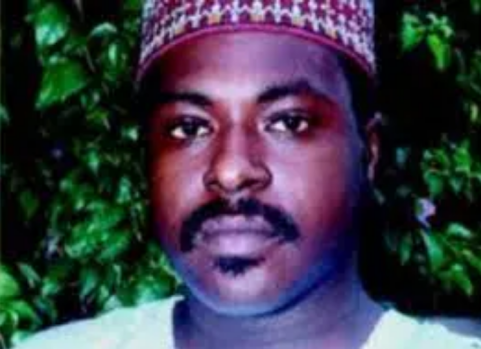
With barely two months into the inauguration of the 1999 set of House of Representatives members, the Green Chamber was rocked by a scandal that is arguably still one of the most daring and barefaced incidents involving a political officeholder in Nigeria.
Ibrahim Salisu Buhari, the young lawmaker from Kano State who had emerged as the Speaker of the House, was exposed to have not only falsified his age, but also presented bogus academic credentials.
According to The News Magazine, which unearthed the scandal, Buhari had claimed that he obtained a Bachelor of Science in Business Administration from the University of Toronto, Canada, in 1990; a diploma in accountancy from Ahmadu Bello University (ABU), Zaria, in 1988; and that he served under the National Youth Service Corps (NYSC) in 1991. Again, Buhari was said to have been born on January 3, 1963.
But it later emerged that Salisu Buhari was actually born on January 3, 1970, making him 29 years old at the time he contested and won election to the House, whereas the constitution pegs the age limit for a member of the House at 30. It was also revealed that he actually got admission into ABU, but he was withdrawn because he falsified his credentials.
Again, available records at the time showed that he never went to the University of Toronto in Canada and did not take part in NYSC, according to The News Magazine.
Though he initially denied the allegations, the revelation that the federal government had concluded plans to prosecute him forced his hand as he tendered his resignation as speaker and member representing Nasarawa federal constituency on July 22, 1999, exactly 49 days after his election.
OBASANJO’S THIRD-TERM POLITICAL AMBITION
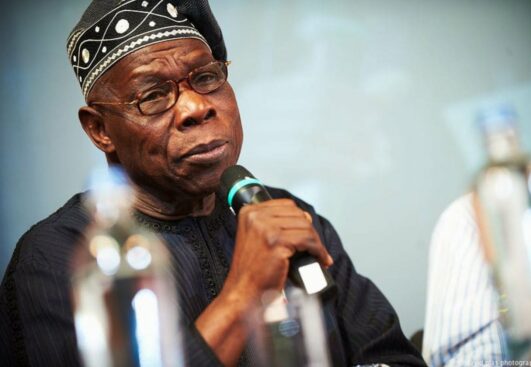
During the twilight of the administration of President Olusegun Obasanjo’s second term in office, Nigeria’s political scene was thrown into pandemonium when the National Assembly was considering a move to change the constitution to allow the president to contest for a third time.
While the former president denied he ever nursed the ambition of ruling the country for another four years, the event showed the readiness of Nigerians to safeguard the democracy attained through blood and sweat.
Ken Nnamani, the Senate President at the time (2006), said at the public presentation of his book, “Standing Strong: Legislative Reforms, Third Term, and Other Issues of the 5th Senate,” that by adjourning the senate in the course of the constitutional amendment process, some senators in support of the bill had a change of mind after interacting with their constituents.
He added that the live transmission of the plenary on May 16, 2006, when an alteration of the constitution to allow three terms for Nigeria’s presidents was being considered, forced some senators to abandon support for the bill.
Years later, the report of some lawmakers being given cash in ‘Ghana-must-go’ bags to vote in favour of the bill remained a major taint on the National Assembly.
2007 PRESIDENTIAL ELECTION

With the third-term presidential attempt of Obasanjo defeated, the elections that brought his predecessor, the late Umaru Musa Ya’ardua, into power were considered the worst in Nigeria’s history.
The conduct of the election made the European Union observers label it as “the worst they had ever seen anywhere in the world, with rampant vote rigging, violence, theft of ballot boxes, and intimidation.”
Apart from this submission, the inability of the INEC to adequately plan for the election threw the process into chaos, with voting commencing in some parts of the country around 5 p.m. on election day due to the late arrival of materials.
Before the election, the INEC did not include the name of Obasanjo’s embattled Vice President, Atiku Abubakar, among the presidential candidates, but the Supreme Court ruled against it a week before the election.
After the election, Ya’ardua proclaimed the election flawed and promised to enact new laws that would strengthen the electoral process.
IMBROGILO OVER JONATHAN’S STATUS IN YAR’ADUA’S ABSENCE
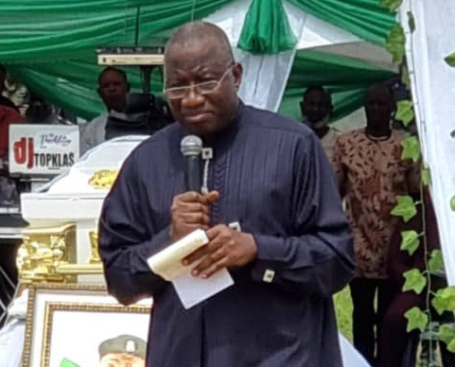
Perhaps one of the most challenging periods in Nigeria’s democratic journey was when then President Umaru Musa Ya’ardua took ill and was flown to Saudi Arabia for treatment without formally handing over to his deputy as envisaged by the constitution.
His absence in the country for 10 weeks stalled governance, which prompted the National Assembly to make his vice president, Goodluck Jonathan, the acting president, a move that was opposed by members of Yar’adua’s cabinet.
The act was termed by the then Senate President, David Mark, as the “doctrine of necessity due to a lack of constitutional precedent.”
Before the solution by the National Assembly, the polity had been heated up along both religious and ethnic lines, with many from the southern part of the country where Jonathan comes, interpreting the power play as a strategic agenda to deny the South-South the opportunity to govern the country.
PATRICIA ETTEH
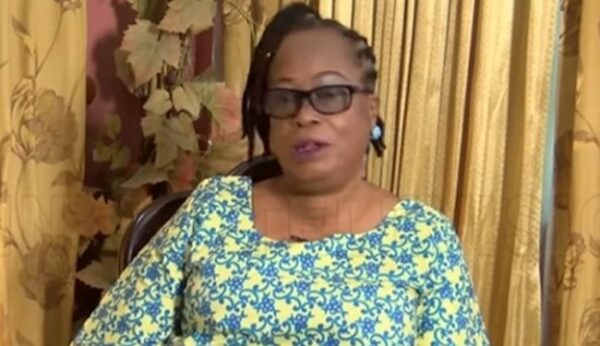
On June 6, 2007, Patricia Etteh became Nigeria’s first female Speaker of the House of Representatives. But the trained hairdresser and beauty therapist, who later became a lawyer, had one of the shortest tenures as the number four citizen of Nigeria.
Two months after her emergence, accusations of corruption were raised against her. She was made to face an ad hoc committee over accusations that she had authorised the spending of N628 million on renovations of her official residence and that of her deputy, and the purchase of 12 official cars meant for the House of Representatives.
During one of the committee’s sittings where she had appeared to defend herself, chants of ‘Thief!’ ‘Thief!” in Yoruba were directed at her, with the session degenerating into a commotion with the lawmakers descending into a free for all. She was eventually escorted out by the security men, and on October 30, 2007, after weeks of pressure, she resigned. Her deputy, Babangida Nguroje, also resigned.
FUEL SUBSIDY AND FAROUK LAWAN’S JOURNEY TO JAIL
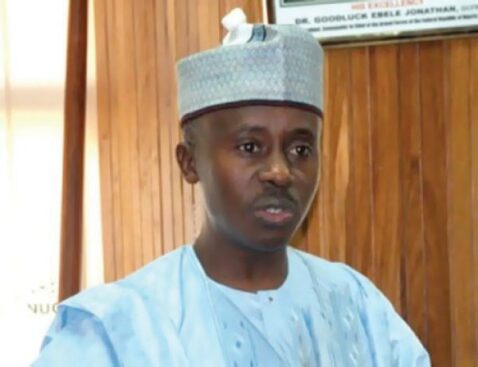
In 2012, the House of Representatives’ ad hoc committee set up to probe petroleum product subsidies came up with the finding that the government overpaid some markers to the tune of N229.7 billion between 2010 and 2011.
The chairman of the committee, Faruk Lawan, the soft-spoken Kano-born lawmaker who had made a name for himself as “Mr. Integrity,” submitted the report, which contained a list of companies that had ‘defrauded’ the government, on the floor of the House. But a few days later, he became enmeshed in a bribery scandal that would later make him an inmate at Kuje Custodial Centre. A video of him receiving and stuffing wands of dollar notes into his cap, ostensibly as a bribe from one of the marketers, emerged.
Almost 10 years later, Justice Angela Otaluka of the FCT High Court convicted him and sentenced him to seven years’ imprisonment for receiving a $500,000 bribe while serving as the chairman of the House’s ad hoc committee.
The court held that Lawan demanded $3 million and received $500,000 as a bribe from Femi Otedola, a Nigerian billionaire oil mogul, in 2012. The judge held that he took the bribe to remove Otedola’s oil company, Zenon Oil and Gas, from the list of firms indicted for fraud in the fuel subsidy regime. His sentence was later reduced to five years by the Supreme Court.
OCCUPY NIGERIA PROTEST
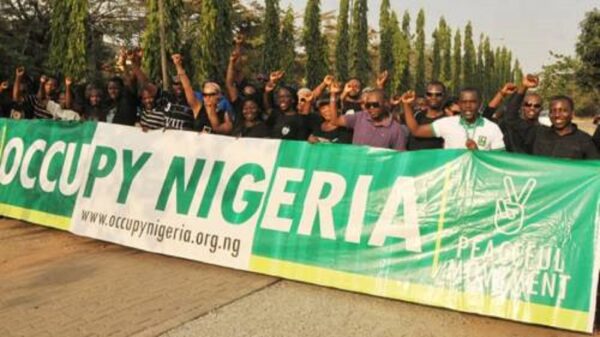
The Occupy Nigeria protest emanated from the decision of the government to remove the fuel subsidy, thereby increasing its cost from N65 per litre to N141.
The protest, which started on January 2, 2012, was a massive movement of Nigerians that nearly crippled the country’s economy as government workers and those in the private sector declared strikes to join the protest.
While the protest took on a political undertone as opposition parties took advantage of it, it served as an avenue for Nigerians to vent their anger over the continued rise in the cost of living and corruption in the country. The continued protest forced the government to lower the cost to N97.
RIOT AT THE NATIONAL ASSEMBLY
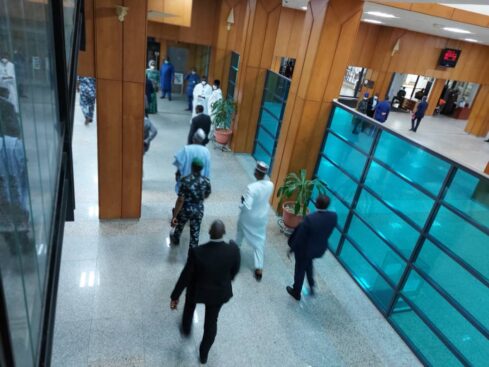
Following the defection of the then Speaker of the House of Representative, Aminu Tambuwal, to the main opposition party, security personnel blocked his access to the national assembly.
This led to chaos in the legislative arm of the country, resulting in a face-off between lawmakers and the police. The latter used tear gas to stop the lawmakers from gaining access to the complex.
With all access to the complex blocked, some of the lawmakers resorted to scaling the fence, while others forced the pedestrian gate open before Tambuwal gained access to the complex.
INVASION OF SENATE PRESIDENT, HIS DEPUTY’S RESIDENCES

In 2018, security operatives were used to intimidate the legislative body, especially the senate, which had been termed by the government as its main opposition.
The first was that of operatives of the DSS storming the residence of Senate President Bukola Saraki to effect his arrest. The arrest warrant was issued by the Inspector General of Police on the basis that he had some questions to answer due to his alleged connection to the perpetrators of the Offa robbery that claimed the lives of residents.
On the same day, the house of his deputy, Ike Ekweremadu, was barricaded by officials of the EFCC on the guise that he had some questions to answer on the case of money laundering.
While Saraki slipped through the arrest, his deputy was not so lucky.
The actions were believed to be a result of the planned defection of the Senate president with some other lawmakers.
Also, a siege was laid on the National Assembly complex by the DSS to prevent lawmakers from gaining access to their chambers in August. This followed the defection of the Senate president to the opposition party.
The aftermath led to the sack of the then-Director General of the DSS.
MACE THEFT

Still in 2018, the Senate was engulfed in drama when its mace was stolen by thugs who stormed the red chambers. While fingers were pointed at Senator Ovie Omo-Agege, who appeared in the chamber in the midst of his suspension, the Delta Central senator denied leading the thugs to the chamber to steal the mace.
According to the police, the mace was eventually found at the City Gate a day after it was stolen, and Omo-Agege was arrested for the theft. He was later released and would end up as the Deputy Senate President in the 9th Assembly.
ORUBEBE’S DISRUPTION OF 2015 ELECTION
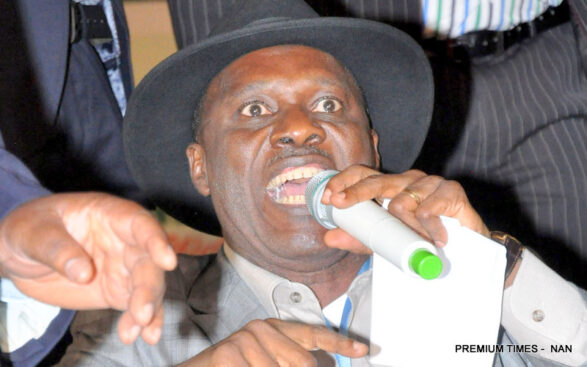
The 2015 election that brought popular opposition figure Muhammadu Buhari to power remains one of the most intriguing in Nigeria’s history, especially at the anti-climax that was witnessed at the collation centre.
While the election was adjudged one of the best and the incumbent conceded defeat even before the official declaration of Buhari as the winner, a former minister of Niger Delta Affairs and representative of President Goodluck Jonathan, Godsday Orubebe, disrupted the collation while making some allegations against the then INEC chairman, Prof. Attahiru Jega, when the former realised his principal would lose the election.
While Jega kept his cool during the drama, the antics of Orubebe, expected to stop the final declaration, will forever be etched in the minds of Nigerians.
[DailyTrust]
Transfer: I want to play for a bigger club – Nwabali hints at next move
Super Eagles goalkeeper, Stanley Nwabali, has dropped the biggest hint that he could leave Chippa United this summer.
Nwabali burst onto the scene at the 2023 Africa Cup of Nations in January this year.
The 27-year-old goalkeeper finished the competition with four clean sheets in seven appearances.
He also made two penalty saves in the shoot-out against South Africa in the quarterfinals.
This season, Nwabali has kept 11 clean sheets for Chippa United in 26 appearances.
Following his impressive performances, Nwabali has become a target for clubs abroad.
Saudi Pro League club Al Ettifaq, English Championship side Queens Park Rangers, and South African side Kaizer Chiefs have all been linked.
Following the final game of the season – a 2-0 defeat to Orlando Pirate – Nwabali dropped a hint on his future.
“Well, everyone would love to leave because when you are in some position, you need to grow,” said Nwabali.
“Like everyone in my position, I would like to grow more. I’m talking about clubs higher than this [bigger than Chippa United] because I have been giving my all to my club this season.
“I just wish to have another challenge at some other place,” Nwabali said.
[DailyPost]

![[OPINION] Africa Day 2024: celebrating Africa with pomp and pageantry - Gabriel Njoku](/media/k2/items/cache/a6debfbae612e0df1f1f4d4082999cc5_Generic.jpg)
![[STATE HOUSE PRESS RELEASE] President Tinubu To Exxonmobil Executives: Executive Orders on Oil and Gas Reforms Will Make Nigeria Globally Competitive](/media/k2/items/cache/4a17f24ac7389e5cd861f1338ff50778_Generic.jpg)
![[PRESS RELEASE] Lagos Set to Generate Power from Solid Waste, As Sanwo-Olu Signs Deal with Dutch Firm](/media/k2/items/cache/fa3c6b992df262e816e2c458afe264c1_Generic.jpg)
![[OPINION] The Uba Sani Bridge - Francis Damina](/media/k2/items/cache/8878ef3c8d6f3cf1e4c68a9ce6629960_Generic.jpg)
![[PRESS RELEASE ]Access Bank Group, Aig-Imoukhuede Foundation Pledge $300m to Transform Africa’s Economic Landscape](/media/k2/items/cache/6ec7606f1e0e8afb4c9ad2df340a6331_Generic.jpg)




